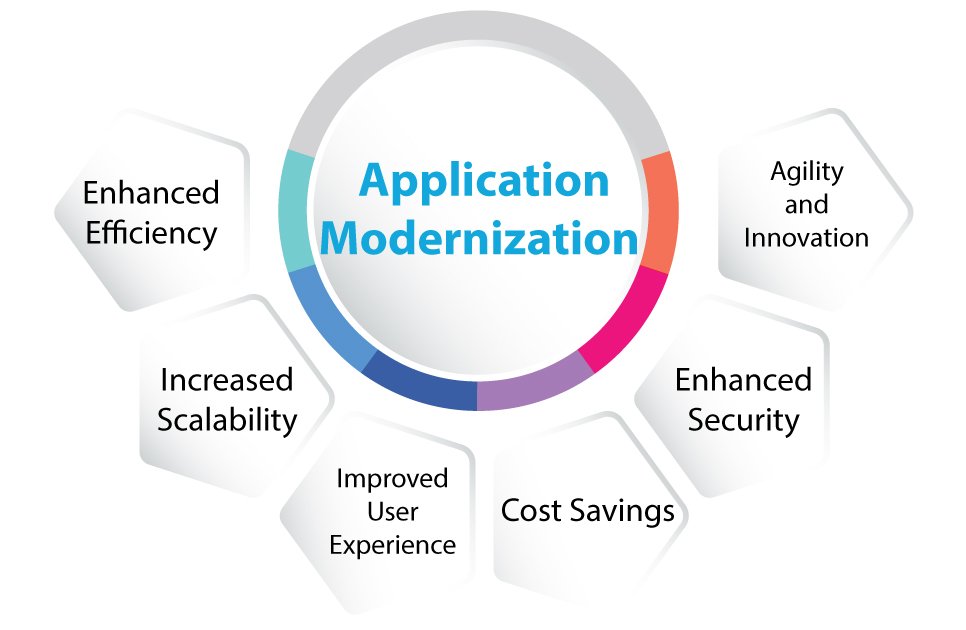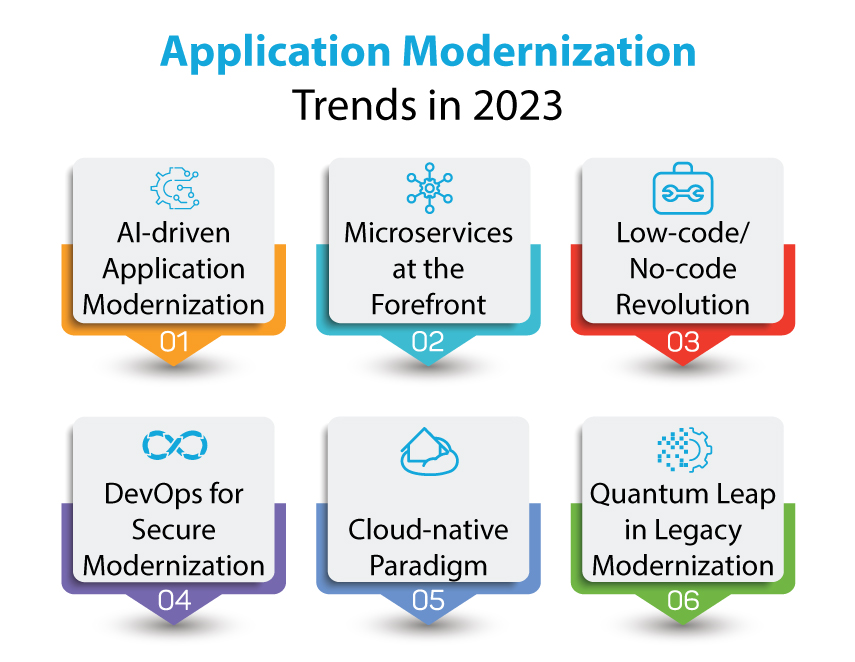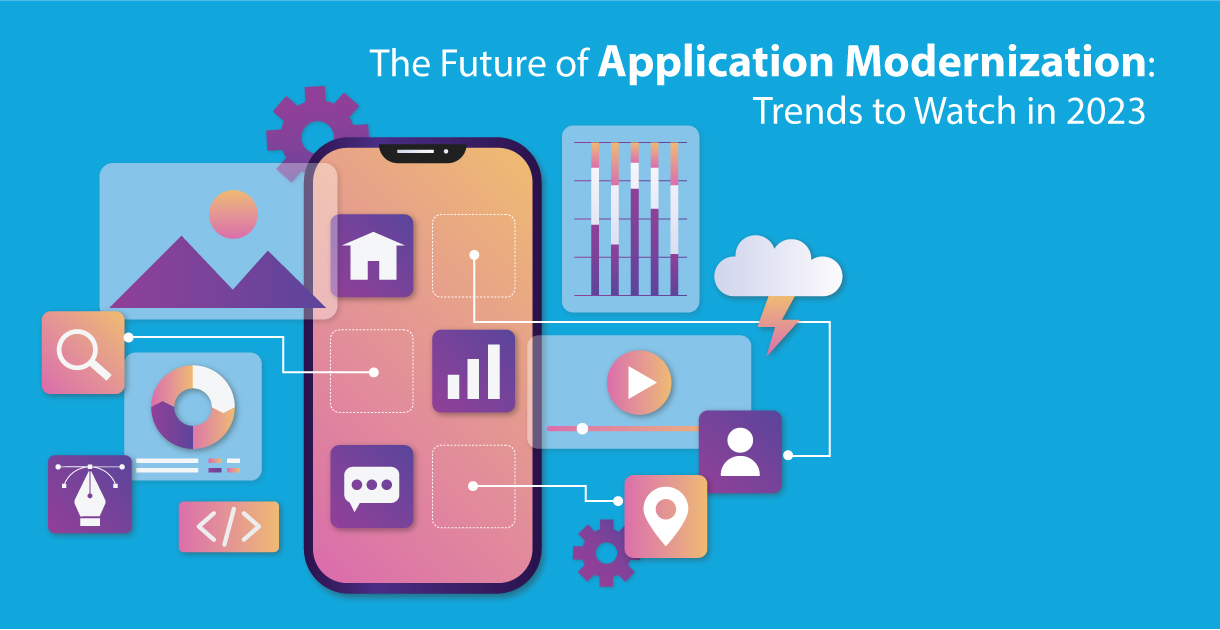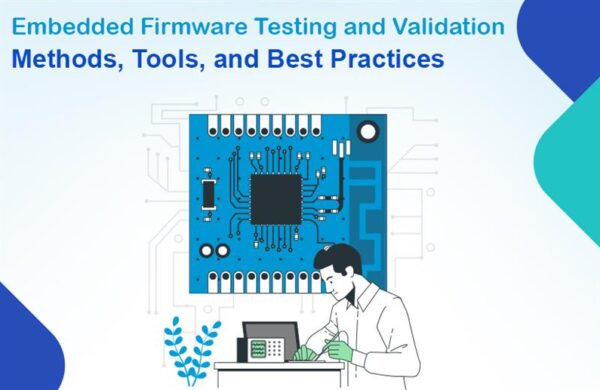Welcome to the cutting-edge realm of application modernization, where the future unfolds before our eyes! In this dynamic blog series, we embark on an exhilarating journey into the latest trends and transformative technologies that will reshape the application landscape in 2023 and beyond. Brace yourself for a whirlwind of innovation as we explore how artificial intelligence, cloud-native architectures, and containerization revolutionize the way we develop, deploy, and maintain applications. Join us as we delve into the realms of microservices, serverless computing, and low-code development, unraveling the mysteries of tomorrow’s software ecosystem. Get ready to embrace the future, as we unlock the secrets to thriving in this rapidly evolving digital age!
What is Application Modernization?
Application modernization refers to the process of updating and enhancing existing software applications to align them with the demands of the contemporary digital landscape. As technology advances at a rapid pace, businesses often find themselves burdened with outdated legacy applications that hinder agility, efficiency, and innovation. Application modernization services aim to address these challenges by transforming and revitalizing these applications, enabling them to leverage the latest technologies and architectures. By embracing app modernization, organizations can unlock benefits such as increased scalability, improved security, enhanced user experience, and streamlined maintenance. With legacy application modernization, businesses can future-proof their software infrastructure and stay competitive in today’s ever-evolving digital marketplace.
Unleashing the Power of Application Modernization: Revolutionizing Business Efficiency, User Experience, and Scalability!
Application modernization offers a wide range of benefits for businesses, making it a crucial investment. By leveraging application modernization services, organizations can unlock the following advantages:

- Enhanced Efficiency: App modernization optimizes the performance of existing applications, streamlining workflows, and reducing operational inefficiencies. This leads to improved productivity and cost savings.
- Increased Scalability: Legacy application modernization enables businesses to scale their software infrastructure to meet growing demands. It allows for the seamless integration of new features, ensuring applications can accommodate increased user loads and adapt to evolving business requirements.
- Improved User Experience: Modernized applications deliver an enhanced user experience through intuitive interfaces, improved performance, and faster response times. This fosters customer satisfaction, loyalty, and increased user engagement.
- Cost Savings: Legacy applications often require expensive maintenance and support. By modernizing these applications, organizations can reduce maintenance costs, eliminate technical debt, and optimize resource allocation.
- Enhanced Security: App modernization addresses security vulnerabilities present in legacy systems, ensuring robust data protection and compliance with industry regulations. Modernizing applications helps organizations stay ahead of cyber threats and safeguard sensitive information.
- Agility and Innovation: Modernized applications leverage advanced technologies such as cloud computing, microservices, and containerization. This enables organizations to rapidly develop and deploy new features, facilitating innovation and adaptability in a competitive market.
By embracing application modernization, businesses can future-proof their software infrastructure, remain competitive, and unlock new opportunities for growth and success.
From Legacy to Luminary: Unveiling the Comprehensive Spectrum of Application Modernization Services
In the realm of application modernization services, businesses unlock a treasure trove of opportunities for growth, efficiency, and innovation. Let’s dive into the comprehensive spectrum of services that pave the path from legacy to luminary.
- Legacy Assessment and Strategy: The journey begins with a thorough evaluation of existing applications, identifying pain points, and formulating a strategic roadmap for modernization. This stage involves analyzing the architecture, dependencies, and scalability requirements.
- Technology and Platform Upgrade: Outdated technologies and platforms hinder progress. Application modernization services facilitate seamless transitions to modern frameworks, cloud-native architectures, and innovative platforms that enable scalability, flexibility, and enhanced performance.
- Application Refactoring and Reengineering: This process involves restructuring the codebase, removing redundant components, and optimizing the application’s design. It focuses on improving maintainability, extensibility, and modularization while ensuring backward compatibility.
- Cloud Adoption and Migration: Harnessing the power of cloud computing is a key aspect of modernization. Services encompass the migration of applications to the cloud, leveraging infrastructure-as-code, microservices, and containerization for increased scalability, cost-efficiency, and agility.
- User Experience (UX) Enhancement: Application modernization aims to deliver exceptional user experiences. UX experts collaborate with designers and developers to revamp interfaces, improve usability, and optimize workflows, resulting in intuitive, engaging, and user-friendly applications.
- Data Migration and Integration: Seamlessly transitioning data from legacy systems to modern databases and integrating it with other applications is vital. Modernization services ensure efficient data migration, synchronization, and integration, facilitating real-time insights and streamlined operations.
- Continuous Monitoring and Support: Application modernization is an ongoing journey. Service providers offer monitoring, maintenance, and support to ensure optimal performance, scalability, and security, allowing businesses to focus on core activities while leaving the technicalities to the experts.
Embracing the comprehensive range of app modernization services propels businesses forward, breathing new life into their software ecosystem. Say farewell to legacy constraints and embark on a transformative journey toward innovation, efficiency, and long-term success.
Pioneering the Next Frontier: Unveiling the Trailblazing Trends Shaping Application Modernization in 2023
In 2023, several pioneering trends are set to revolutionize the way organizations approach the modernization of their software ecosystems. Let’s explore these trailblazing trends that promise to shape the future of application modernization.

- AI-driven Application Modernization: Artificial Intelligence (AI) is poised to become a game-changer in the modernization realm. From intelligent code analysis and automated refactoring to AI-powered testing and performance optimization, organizations are harnessing AI to expedite and enhance the modernization process.
- Microservices at the Forefront: Microservices architecture continues to gain prominence as a driving force in application modernization. By breaking down monolithic applications into modular, independently deployable services, organizations can achieve greater agility, scalability, and flexibility, enabling rapid innovation and seamless integration with modern technologies.
- Low-code/No-code Revolution: Empowering citizen developers and accelerating application development, low-code/no-code platforms are reshaping the modernization landscape. These platforms simplify the process by offering visual interfaces, drag-and-drop functionality, and pre-built components, allowing businesses to rapidly modernize their applications with minimal coding effort.
- DevOps for Secure Modernization: With cybersecurity concerns at an all-time high, DevOps emerges as a vital trend in application modernization. By integrating security practices throughout the modernization lifecycle, organizations ensure that security remains at the core of their modernized applications, safeguarding against potential vulnerabilities.
- Cloud-native Paradigm: The cloud-native approach continues to dominate the modernization scene. By leveraging cloud services, containers, and orchestration platforms, businesses can achieve unprecedented scalability, flexibility, and resilience, enabling seamless app modernization in a cloud-native environment.
- Quantum Leap in Legacy Modernization: As legacy systems present persistent challenges, 2023 witnesses a quantum leap in legacy modernization. With technologies like emulation, automated code conversion, and rehosting, organizations can efficiently migrate and modernize their legacy applications, unlocking the benefits of modern architectures while preserving business-critical functionality.
Stay ahead of the curve by embracing these cutting-edge trends shaping the future of application modernization in 2023.
Conclusion
In the dynamic realm of application modernization, 2023 promises to be a year of incredible innovation and transformative trends. As organizations strive to stay ahead in a rapidly evolving digital landscape, the significance of application modernization services becomes even more evident. Embracing cutting-edge technologies such as AI-driven modernization, microservices architecture, low-code/no-code platforms, DevOps practices, cloud-native paradigms, and innovative legacy modernization techniques empowers businesses to unlock unparalleled efficiency, scalability, and agility. These trends herald a new era where legacy application modernization takes a quantum leap, paving the way for future-ready software ecosystems. In this era of Monarch Innovation, organizations that embrace these trends will soar above the competition, propelling themselves toward success in the ever-evolving world of application modernization.





